Charles E W Bean, Diaries, AWM38 3DRL 606/117/1 - September - December 1918 - Part 4
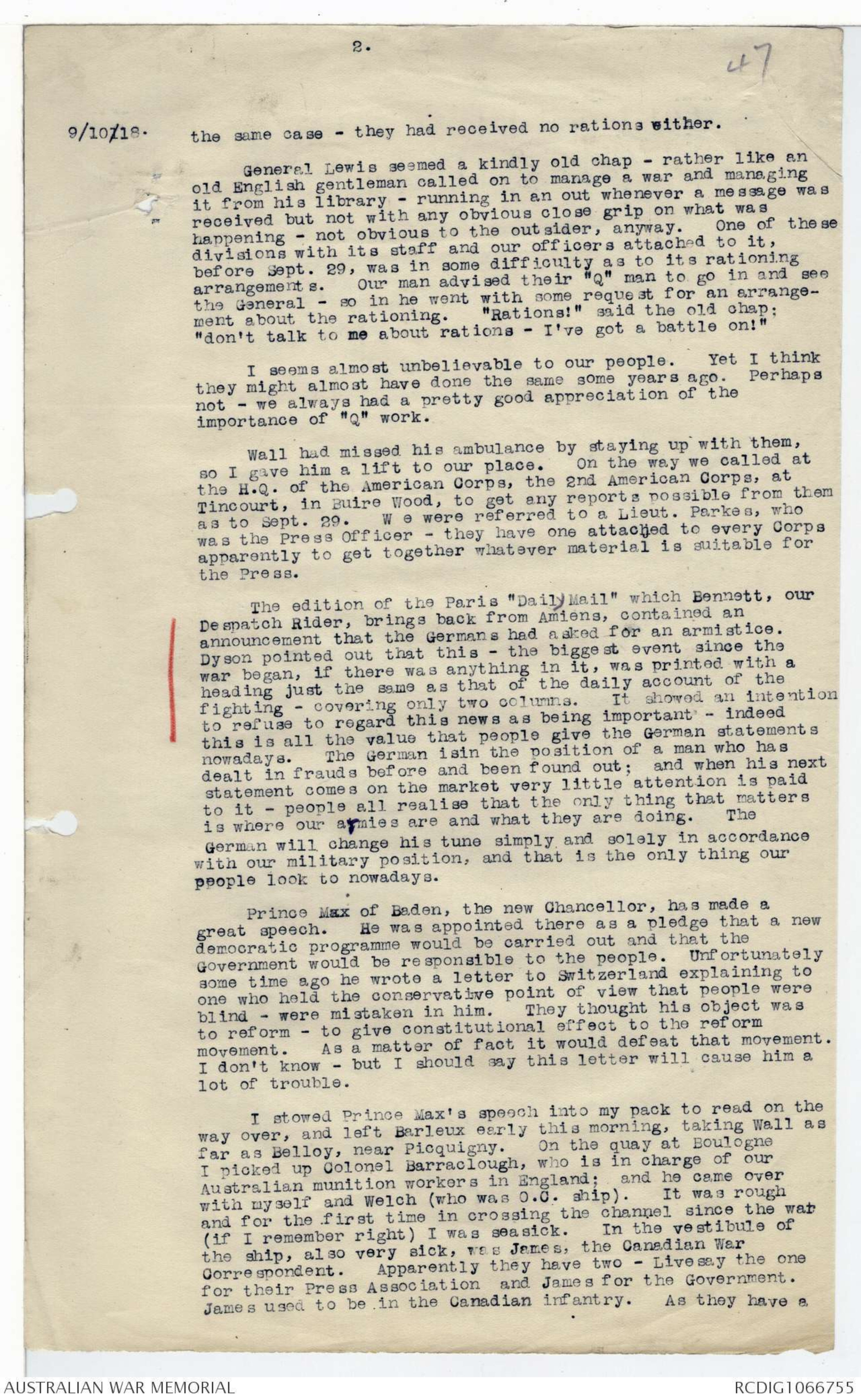
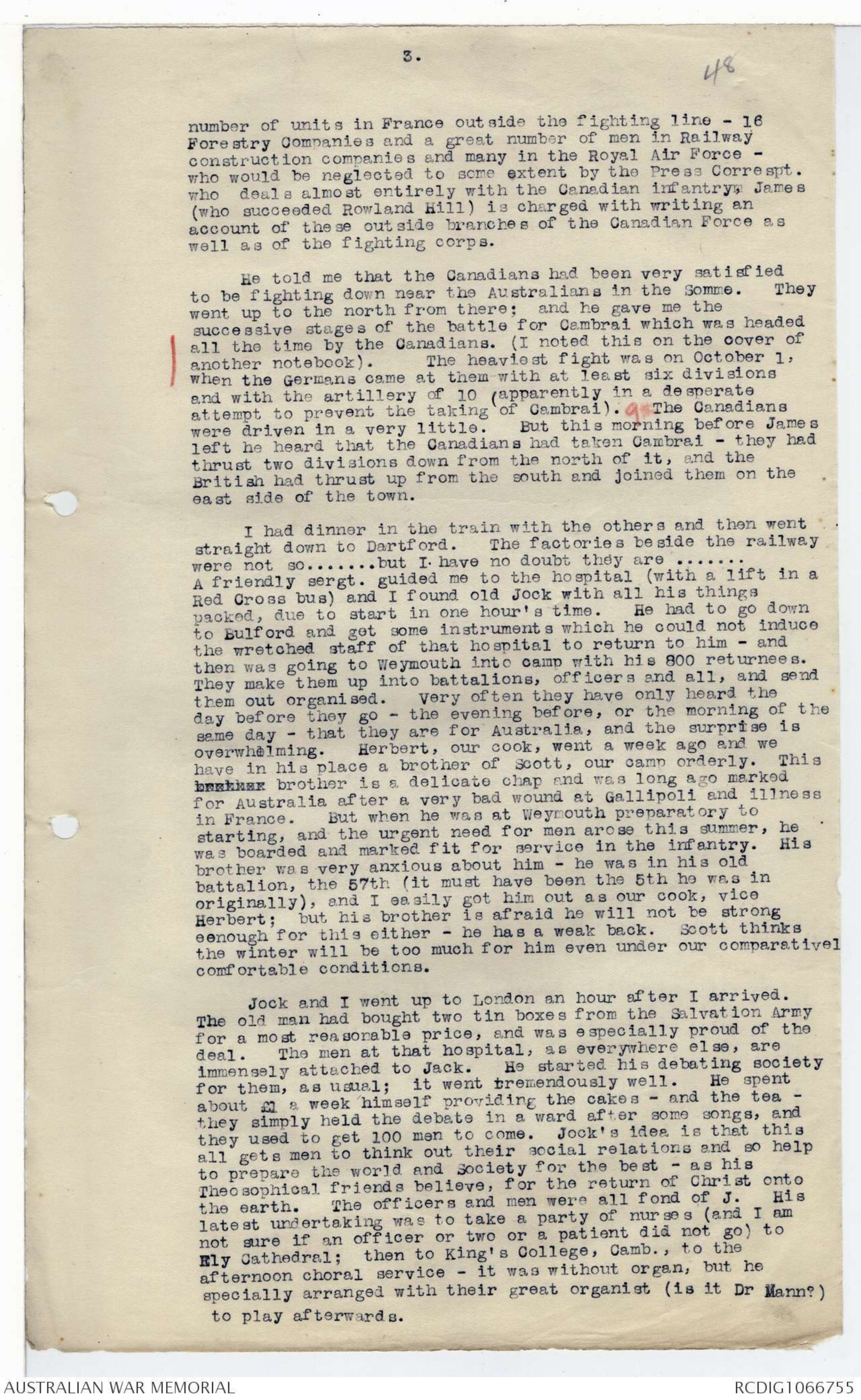
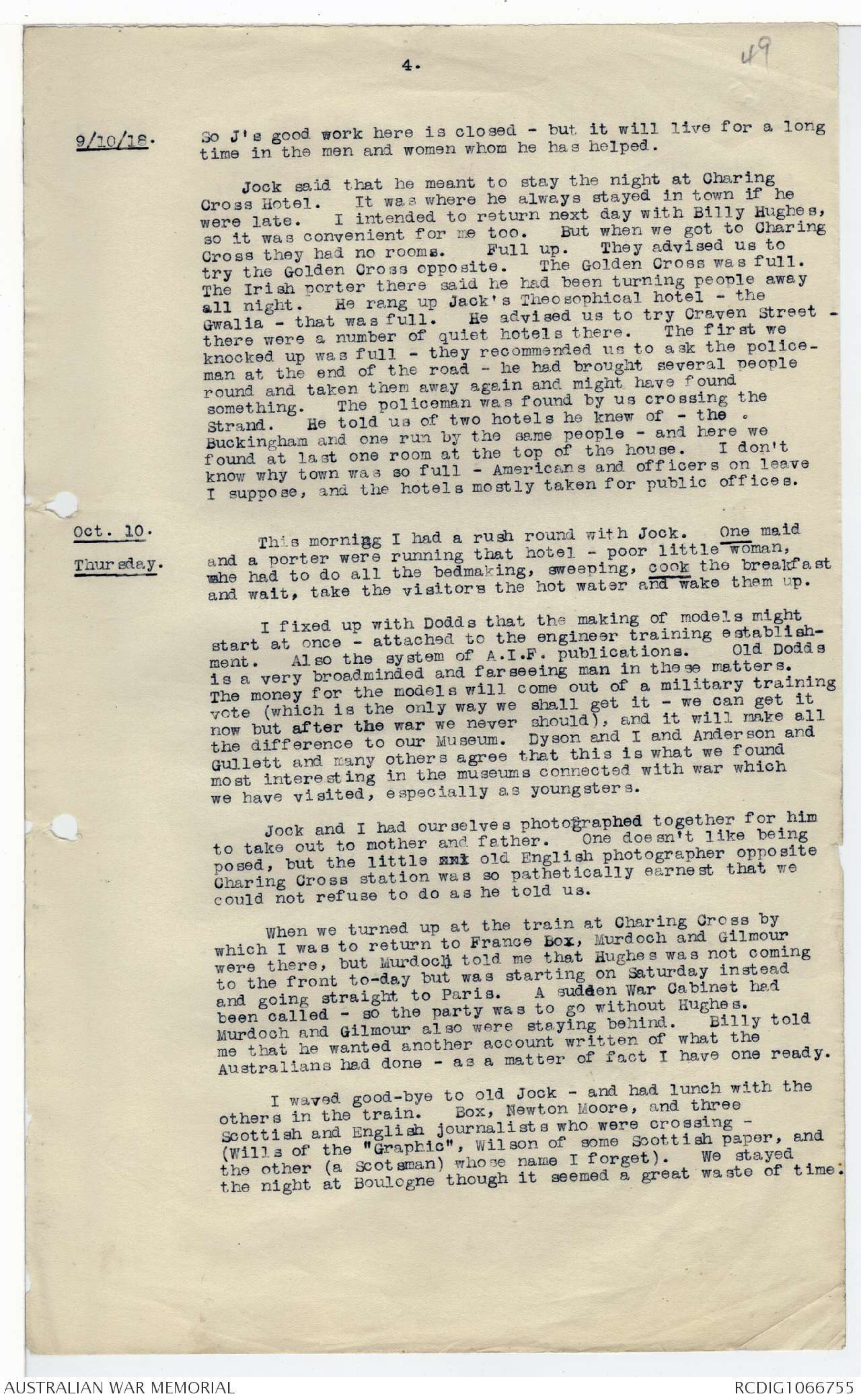
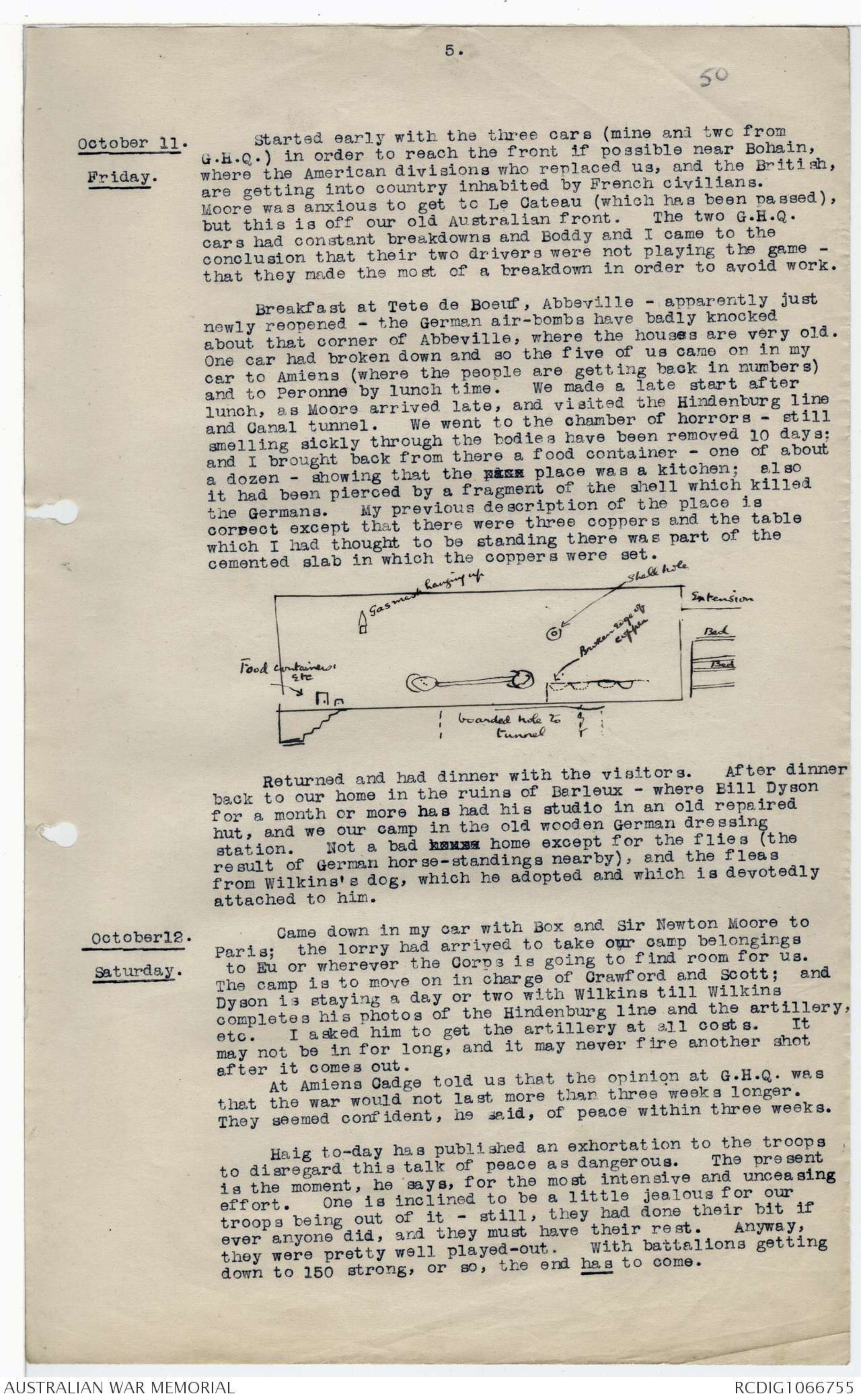
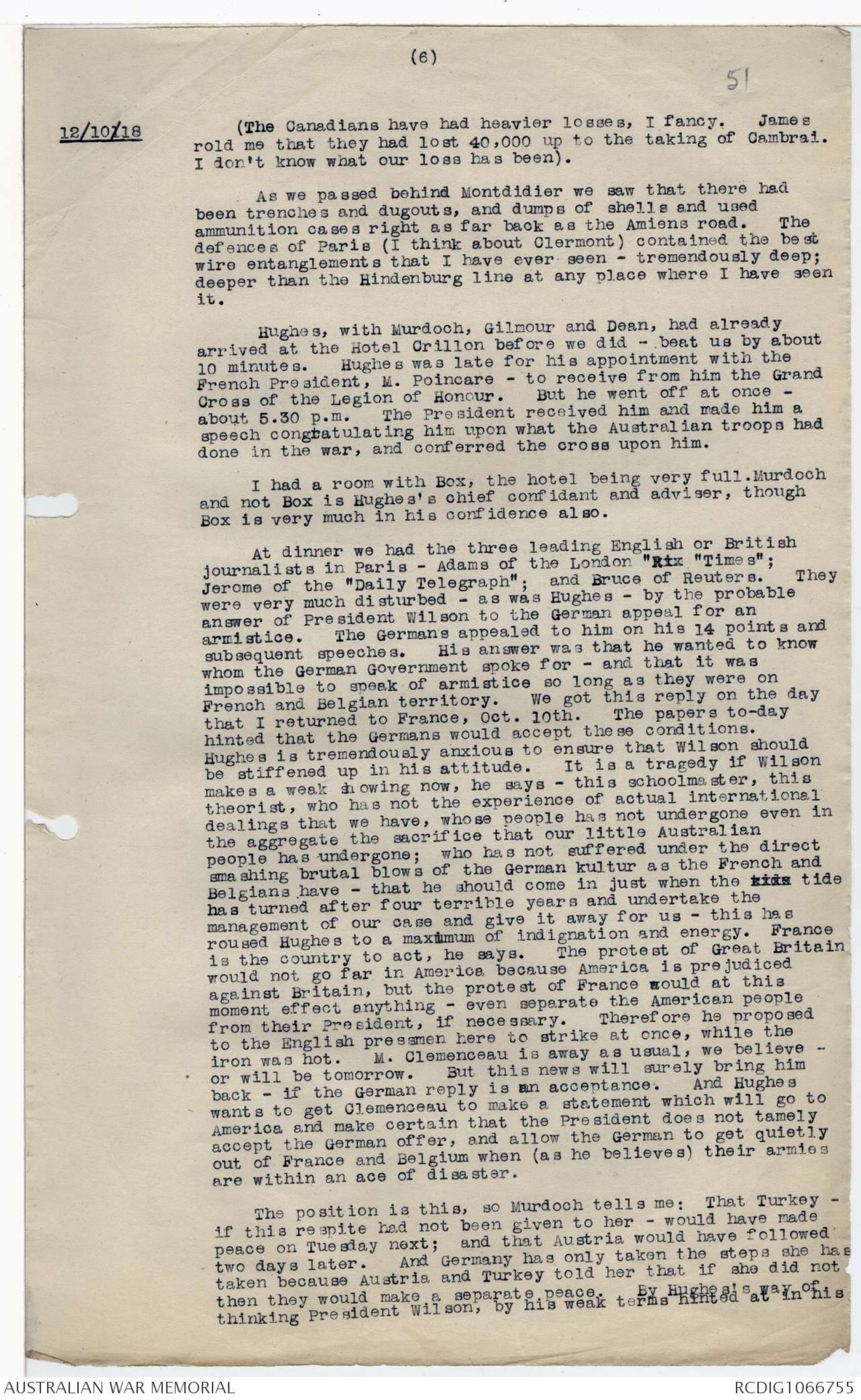
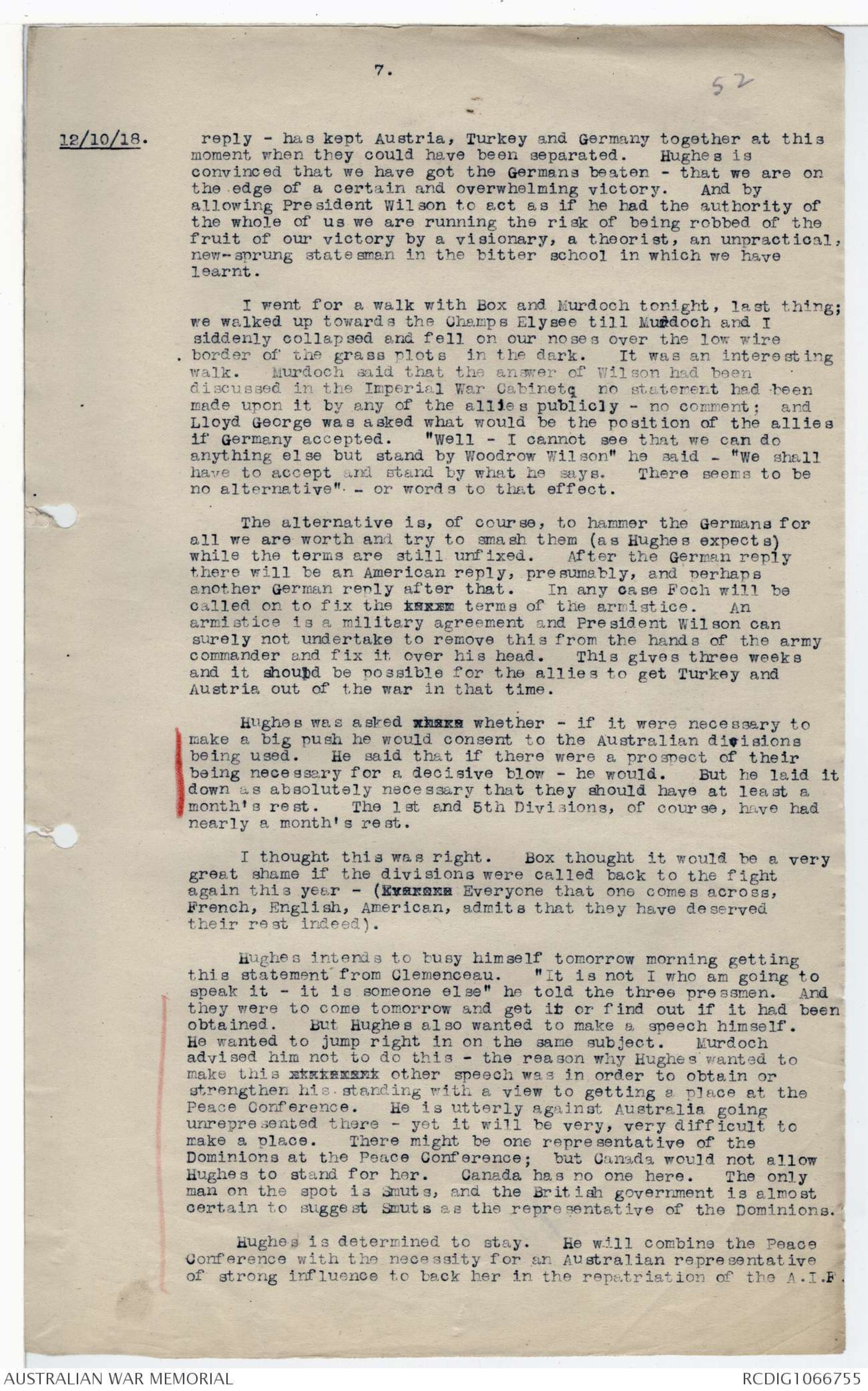
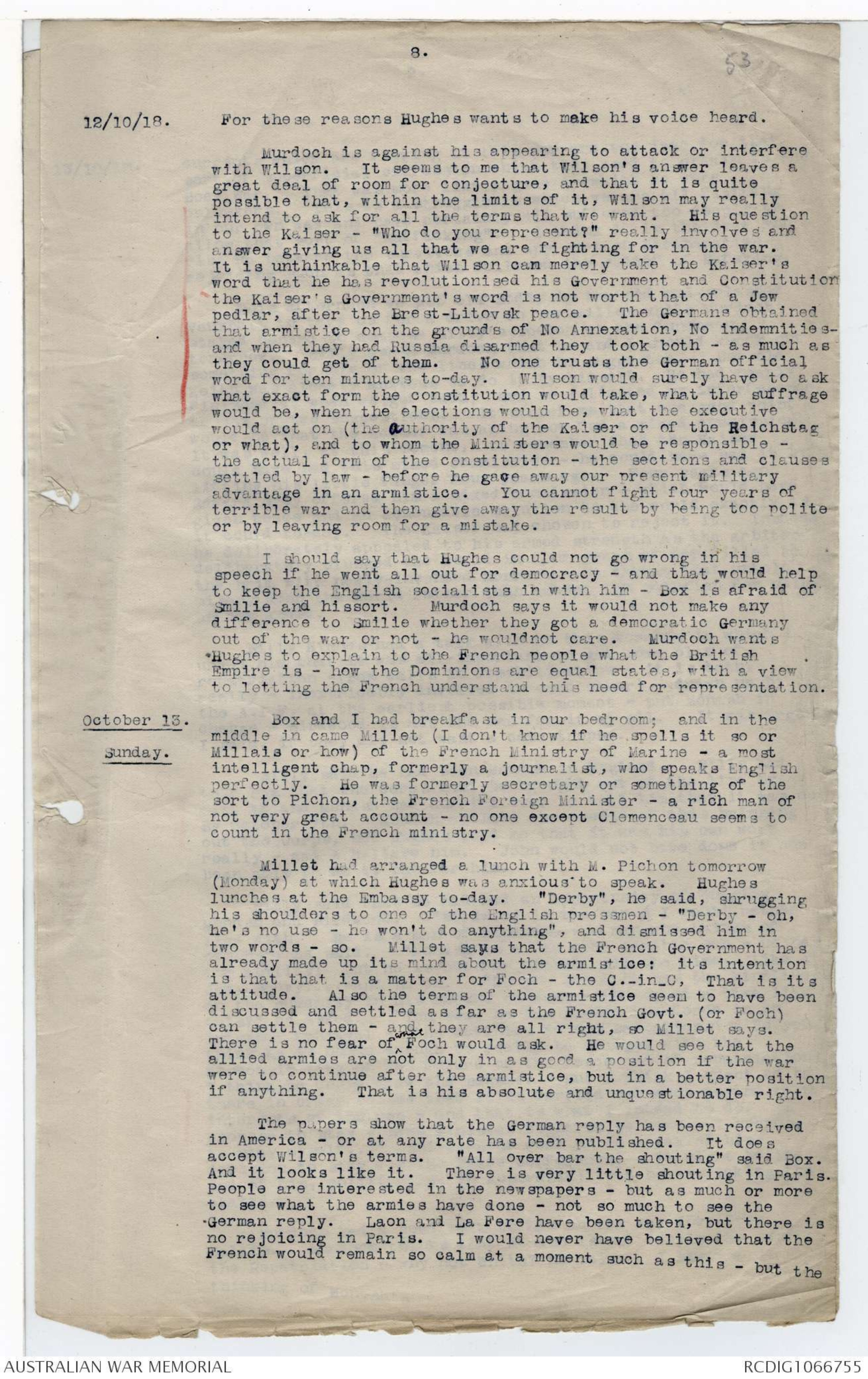
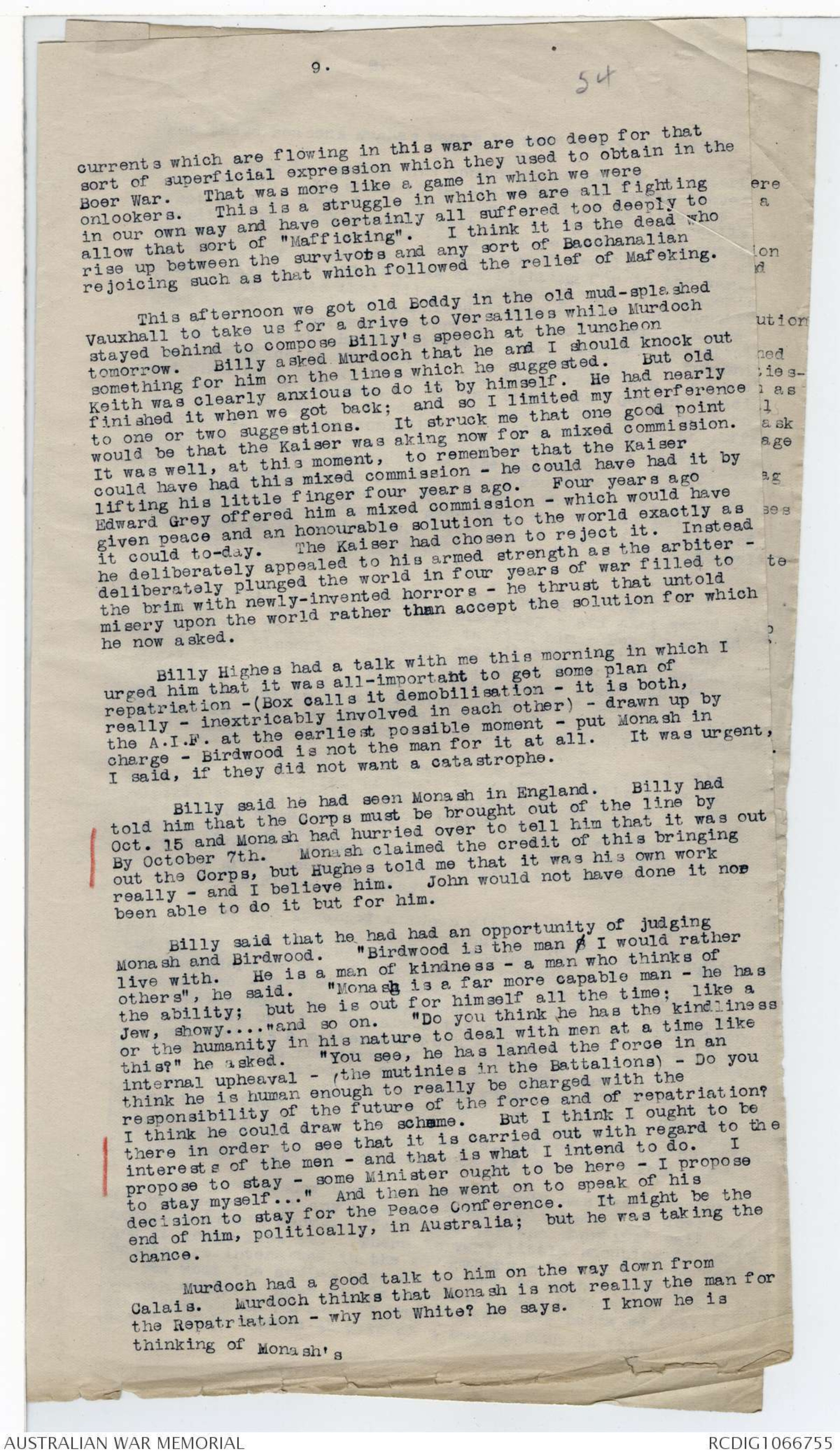
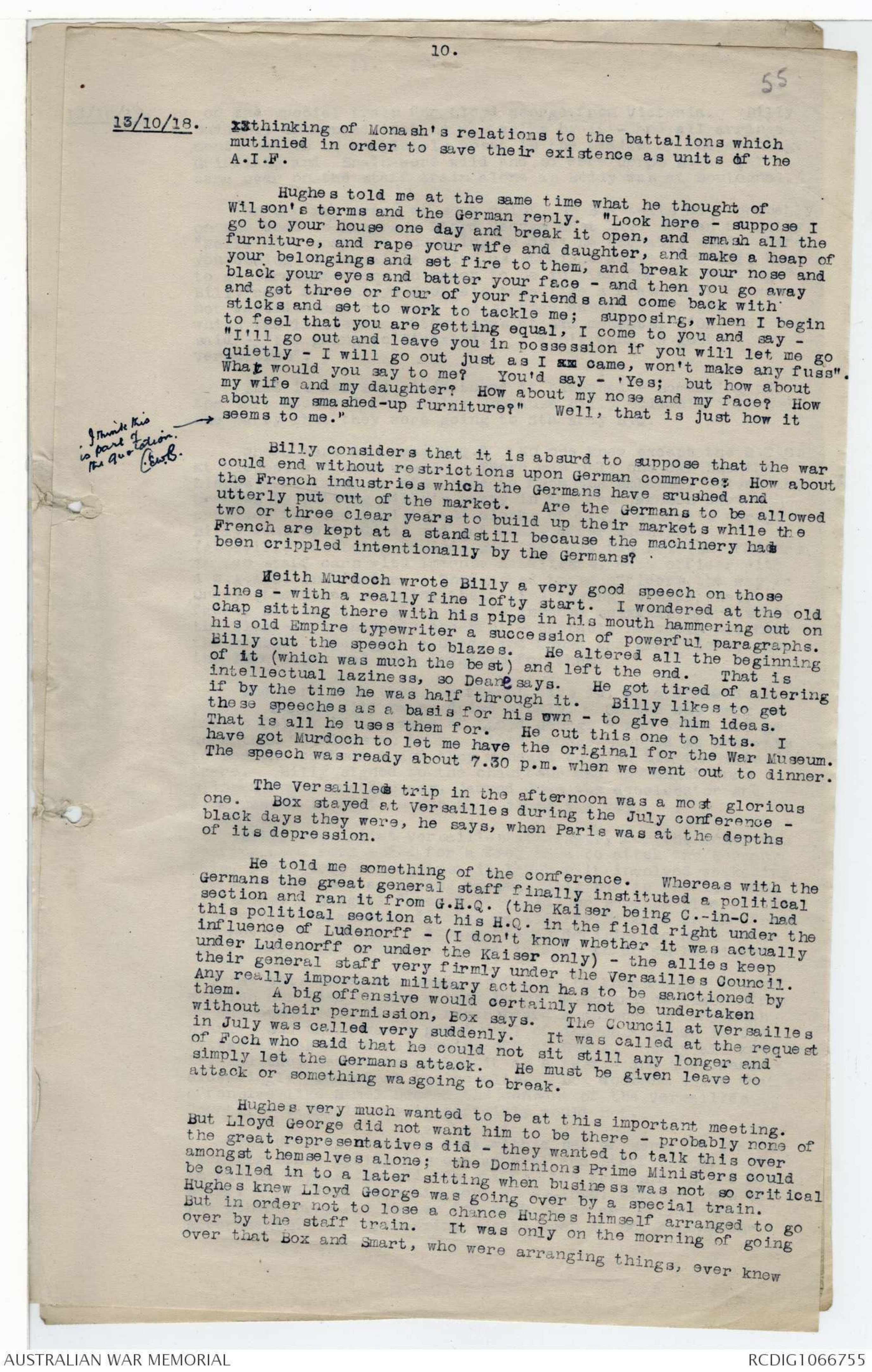
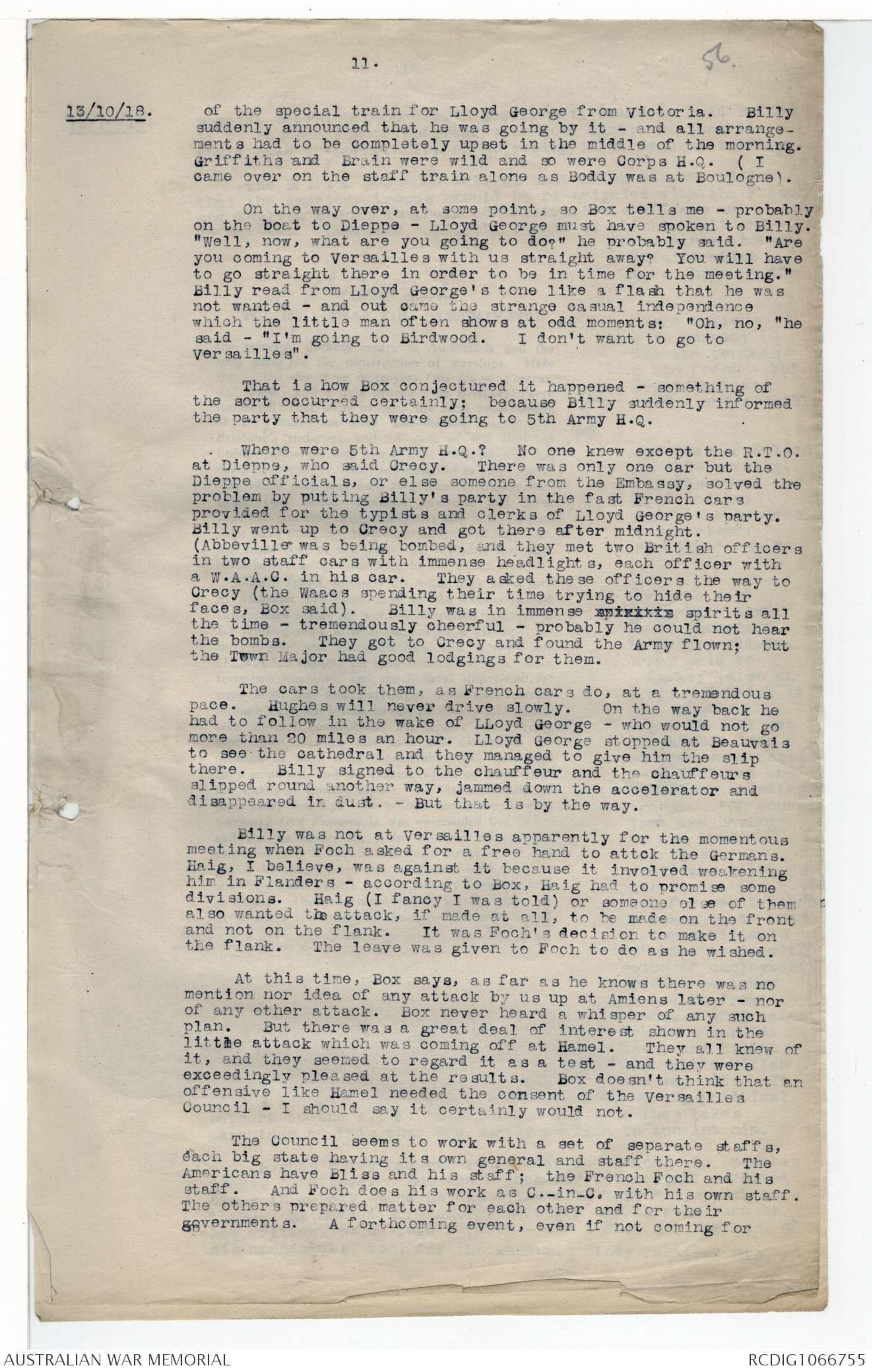
2.
47
[*9/10/18.*]
the same case - they had received no rations wither.
General Lewis seemed a kindly old chap - rather like an
old English gentleman called on to manage a war and managing
it from his library - running in an out whenever a message was
received but not with any obvious close grip on what was
happening - not obvious to the outsider, anyway. One of these
divisions with its staff and our officers attached to it,
before Sept. 29, was in some difficulty as to its rationing
arrangements. Our man advised their "Q" man to go in and see
the General - so in he went with some request for an arrange-
ment about the rationing. "Rations!" said the old chap;
"don't talk to me about rations - I've got a battle on!"
I seems almost unbelievable to our people. Yet I think
they might almost have done the same some years ago. Perhaps
not - we always had a pretty good appreciation of the
importance of "Q" work.
Wall had missed his ambulance by staying up with them,
so I gave him a lift to our place. On the way we called at
the H.Q. of the American Corps, the 2nd American Corps, at
Tincourt, in Buire Wood, to get any reports possible from them
as to Sept. 29. We were referred to a Lieut. Parkes, who
was the Press Officer - they have one attached to every Corps
apparently to get together whatever material is suitable for
the Press.
The edition of the Paris "Daily Mail" which Bennett, our
Despatch Rider, brings back from Amiens, contained an
announcement that the Germans had asked for an armistice.
Dyson pointed out that this - the biggest event since the
war began, if there was anything in it, was printed with a
heading just the same as that of the daily account of the
fighting - covering only two columns. It showed an intention
to refuse to regard this news as being important- indeed
this is all the value that people give the German statements
nowadays. The German isin the position of a man who has
dealt in frauds before and been found out; and when his next
statement comes on the market very little attention is paid
to it - people all realise that the only thing that matters
is where our armies are and what they are doing. The
German will change his tune simply and solely in accordance
with our military position, and that is the only thing our
people look to nowadays.
Prince Max of Baden, the new Chancellor, has made a
great speech. He was appointed there as a pledge that a new
democratic programme would be carried out and that the
Government would be responsible to the people. Unfortunately
some time ago he wrote a letter to Switzerland explaining to
one who held the conservative point of view that people were
blind - were mistaken in him. They thought his object was
to reform - to give constitutional effect to the reform
movement. As a matter of fact it would defeat that movement.
I don't know - but I should say this letter will cause him a
lot of trouble.
I stowed Prince Max's speech into my pack to read on the
way over, and left Barleux early this morning, taking Wall as
far as Belloy, near Picquigny. On the quay at Boulogne
I picked up Colonel Barraclough, who is in charge of our
Australian munition workers in England; and he came over
with myself and Welch (who was O.C. ship). It was rough
and for the first time in crossing the channel since the war
(if I remember right) I was seasick. In the vestibule of
the ship, also very sick, was James, the Canadian War
Correspondent. Apparently they have two - Livesay the one
for their Press Association and James for the Government.
James used to be in the Canadian infantry. As they have a
3.
48
number of units in France outside the fighting line - 16
Forestry Companies and a great number of men in Railway
construction companies and many in the Royal Air Force -
who would be neglected to some extent by the Press Correspt.
who deals almost entirely with the Canadian infantry, James
(who succeeded Rowland Hill) is charged with writing an
account of these outside branches of the Canadian Force as
well as of the fighting corps.
He told me that the Canadians had been very satisfied
to be fighting down near the Australians in the Somme. They
went up to the north from there; and he gave me the
successive stages of the battle for Cambrai which was headed
all the time by the Canadians. (I noted this on the cover of
another notebook). The heaviest fight was on October 1,
when the Germans came at them with at least six divisions
and with the artillery of 10 (apparently in a desperate
attempt to prevent the taking of Cambrai). The Canadians
were driven in a very little. But this morning before James
left he heard that the Canadians had taken Cambrai - they had
thrust two divisions down from the north of it, and the
British had thrust up from the south and joined them on the
east side of the town.
I had dinner in the train with the others and then went
straight down to Dartford. The factories beside the railway
were not so.......but I have no doubt they are .... . ..
A friendly sergt. guided me to the hospital (with a lift in a
Red Cross bus) and I found old Jock with all his things
packed, due to start in one hour's time. He had to go down
to Bulford and get some instruments which he could not induce
the wretched staff of that hospital to return to him - and
then was going to Weymouth into camp with his 800 returnees.
They make them up into battalions, officers and all, and send
them out organised. Very often they have only heard the
day before they go - the evening before, or the morning of the
same day - that they are for Australia, and the surprise is
overwhelming. Herbert, our cook, went a week ago and we
have in his place a brother of Scott, our camp orderly. This
brother is a delicate chap and was long ago marked
for Australia after a very bad wound at Gallipoli and illness
in France. But when he was at Weymouth preparatory to
starting, and the urgent need for men arose this summer, he
was boarded and marked fit for service in the infantry. His
brother was very anxious about him - he was in his old
battalion, the 57th (it must have been the 5th he was in
originally), and I easily got him out as our cook, vice
Herbert; but his brother is afraid he will not be strong
eenough for this either - he has a weak back. Scott thinks
the winter will be too much for him even under our comparativel
comfortable conditions.
Jock and I went up to London an hour after I arrived.
The old man had bought two tin boxes from the Salvation Army
for a most reasonable price, and was especially proud of the
deal. The men at that hospital, as everywhere else, are
immenssly attached to Jack. He started his debating society
for them, as usual; it went tremendously well. He spent
about £1 a week himself providing the cakes - and the tea -
they simply held the debate in a ward after some songs, and
they used to get 100 men to come. Jock's idea is that this
all gets men to think out their social relations and so help
to prepare the world and Society for the best - as his
Theosophical friends believe, for the return of Christ onto
the earth. The officers and men were all fond of J. His
latest undertaking was to take a party of nurses (and I am
not sure if an officer or two or a patient did not go) to
Ely Cathedral; then to King's College, Camb., to the
afternoon choral service - it was without organ, but he
specially arranged with their great organist (is it Dr Mannz)
to play afterwards.
4.
49
[*9/10/18.*]
So J's good work here is closed - but it will live for a long
time in the men and women whom he has helped.
Jock said that he meant to stay the night at Charing
Cross Hotel. It was where he always stayed in town if he
were late. I intended to return next day with Billy Hughes,
so it was convenient for me too. But when we got to Charing
Cross they had no rooms. Full up. They advised us to
try the Golden Cross opposite. The Golden Cross was full.
The Irish porter there said he had been turning people away
all night. He rang up Jack's Theosophical hotel - the
Gwalia - that was full. He advised us to try Craven Street-
there were a number of quiet hotels there. The first we
knocked up was full - they recommended us to ask the police-
man at the end of the road - he had brought several people
round and taken them away again and might have found
something. The policeman was found by us crossing the
Strand. He told us of two hotels he knew of - the
Buckingham and one run by the same people - and here we
found at last one room at the top of the house. I don't
know why town was so full - Americans and officers on leave
I suppose, and the hotels mostly taken for public offices.
[*Oct. 10.*] This morning I had a rush round with Jock. One maid
[*Thursday*] and a porter were running that hotel - poor little woman,
who had to do all the bedmaking, sweeping, cook the breakfast
and wait, take the visitors the hot water and wake them up.
I fixed up with Dodds that the making of models might
start at once - attached to the engineer training establish-
ment. Also the system of A.I.F. publications. Old Dodds
is a very broadminded and farseeing man in these matters.
The money for the models will come out of a military training
vote (which is the only way we shall get it - we can get it
now but after the war we never should), and it will make all
the difference to our Museum. Dyson and I and Anderson and
Gullett and many others agree that this is what we found
most interesting in the museums connected with war which
we have visited, especially as youngsters.
Jock and I had ourselves photographed together for him
to take out to mother and father. One doesn't like being
posed, but the little old English photographer opposite
Charing Cross station was so pathetically earnest that we
could not refuse to do as he told us.
When we turned up at the train at Charing Cross by
which I was to return to France Box, Murdoch and Gilmour
were there, but Murdoch told me that Hughes was not coming
to the front to-day but was starting on Saturday instead
and going straight to Paris. A sudden War Cabinet had
been called - so the party was to go without Hughes.
Murdoch and Gilmour also were staying behind. Billy told
me that he wanted another account written of what the
Australians had done - as a matter of fact I have one ready.
I waved good-bye to old Jock - and had lunch with the
others in the train. Box, Newton Moore, and three
Scottish and English journalists who were crossing-
(Wills of the "Graphic", Wilson of some Scottish paper, and
the other (a Scotsman) whose name I forget). We stayed
the night at Boulogne though it seemed a great waste of time:
5.
50
[*October 11*] Started early with the three cars (mine and two from
[*Friday*] G.H.Q.) in order to reach the front if possible near Bohain,
where the American divisions who replaced us, and the British,
are getting into country inhabited by French civilians.
Moore was anxious to get to Le Cateau (which has been passed),
but this is off our old Australian front. The two G.H.Q.
cars had constant breakdowns and Boddy and I came to the
conclusion that their two drivers were not playing the game
that they made the most of a breakdown in order to avoid work.
Breakfast at Tete de Boeuf, Abbeville - apparently just
newly reopened - the German air-bombs have badly knocked
about that corner of Abbeville, where the houses are very old.
One car had broken down and so the five of us came on in my
car to Amiens (where the people are getting back in numbers)
and to Peronne by lunch time. We made a late start after
lunch, as Moore arrived late, and visited the Hindenburg line
and Canal tunnel. We went to the chamber of horrors - still
smelling sickly through the bodies have been removed 10 days:
and I brought back from there a food container - one of about
a dozen - showing that the xxxx place was a kitchen; also
it had been pierced by a fragment of the shell which killed
the Germans. My previous description of the place is
correct except that there were three coppers and the table
which I had thought to be standing there was part of the
cemented slab in which the coppers were set.
(Sketch - see original)
Returned and had dinner with the visitors. After dinner
back to our home in the ruins of Barleux - where Bill Dyson
for a month or more has had his studio in an old repaired
hut, and we our camp in the old wooden German dressing
station. Not a bad xxxxx home except for the flies (the
result of German horse-standings nearby), and the fleas
from Wilkins's dog, which he adopted and which is devotedly
attached to him.
[*October12.*] Came down in my car with Box and Sir Newton Moore to [*Saturday.*]Paris; the lorry had arrived to take our camp belongings
to Eu or wherever the Corps is going to find room for us.
The camp is to move on in charge of Crawford and Scott; and
Dyson is staying a day or two with Wilkins till Wilkins
completes his photos of the Hindenburg line and the artillery,
etc. I asked him to get the artillery at all costs. It
may not be in for long, and it may never fire another shot
after it comes out.
At Amiens Cadge told us that the opinion at G.H.Q. was
that the war would not last more than three weeks longer.
They seemed confident, he said, of peace within three weeks.
Haig to-day has published an exhortation to the troops
to disregard this talk of peace as dangerous. The present
is the moment, he says, for the most intensive and unceasing
effort. One is inclined to be a little jealous for our
troops being out of it - still, they had done their bit if
ever anyone did, and they must have their rest. Anyway,
they were pretty well played-out. With battalions getting
down to 150 strong, or so, the end has to come.
(6)
51
[*12/10/18*] (The Canadians have had heavier losses, I fancy. James
rold me that they had lost 40,000 up to the taking of Cambrai.
I don't know what our loss has been).
As we passed behind Montdidier we saw that there had
been trenches and dugouts, and dumps of shells and used
ammunition cases right as far back as the Amiens road. The
defences of Paris (I think about Clermont) contained the best
wire entanglements that I have ever seen - tremendously deep;
deeper than the Hindenburg line at any place where I have seen
it.
Hughes, with Murdoch, Gilmour and Dean, had already
arrived at the Hotel Crillon before we did - beat us by about
10 minutes. Hughes was late for his appointment with the
French President, M. Poincare - to receive from him the Grand
Cross of the Legion of Honour. But he went off at once -
about 5.30 p.m. The President received him and made him a
speech congratulating him upon what the Australian troops had
done in the war, and conferred the cross upon him.
I had a room with Box, the hotel being very full. Murdoch
and not Box is Hughes's chief confidant and adviser, though
Box is very much in his confidence also.
At dinner we had the three leading English or British
journalists in Paris - Adams of the London "Riz "Times";
Jerome of the "Daily Telegraph" and Bruce of Reuters. They
were very much disturbed - as was Hughes - by the probable
answer of President Wilson to the German appeal for an
armistice. The Germans appealed to him on his 14 points and
subsequent speeches. His answer was that he wanted to know
whom the German Government spoke for - and that it was
impossible to speak of armistice so long as they were on
French and Belgian territory. We got this reply on the day
that I returned to France, Oct. 10th. The papers to-day
hinted that the Germans would accept these conditions.
Hughes is tremendously anxious to ensure that Wilson should
be stiffened up in his attitude. It is a tragedy if Wilson
makes a weak showing now, he says - this schoolmaster, this
theorist, who has not the experience of actual international
dealings that we have, whose people has not undergone even in
the aggregate the sacrifice that our little Australian
people has undergone; who has not suffered under the direct
smashing brutal blows of the German kultur as the French and
Belgians, have - that he should come in just when the xxxx tide
has turned after four terrible years and undertake the
management of our case and give it away for us - this has
roused Hughes to a maximum of indignation and energy. France
is the country to act, he says. The protest of Great Britain
would not go far in America because America is prejudiced
against Britain, but the protest of France would at this
moment effect anything - even separate the American people
from their President, if necessary. Therefore he proposed
to the English pressmen here to strike at once, while the
iron was hot. M. Clemenceau is away as usual, we believe -
or will be tomorrow. But this news will surely bring him
back - if the German reply is an acceptance. And Hughes
wants to get Clemenceau to make a statement which will go to
America and make certain that the President does not tamely
accept the German offer, and allow the German to get quietly
out of France and Belgium when (as he believes) their armies
are within an ace of disaster.
The position is this, so Murdoch tells me: That Turkey -
if this respite had not been given to her - would have made
peace on Tuesday next; and that Austria would have followed'
two days later. And Germany has only taken the steps she has
taken because Austria and Turkey told her that if she did not
then they would make a separate peace. By Hughe's way of
thinking President Wilson, by his weak terms hinted at in his
7.
52
[*12/10/18.*] reply - has kept Austria, Turkey and Germany together at this
moment when they could have been separated. Hughes is
convinced that we have got the Germans beaten - that we are on
the edge of a certain and overwhelming victory. And by
allowing President Wilson to act as if he had the authority of
the whole of us we are running the risk of being robbed of the
fruit of our victory by a visionary, a theorist, an unpractical,
new-sprung statesman in the bitter school in which we have
learnt.
I went for a walk with Box and Murdoch tonight, last thing;
we walked up towards the Champs Elysee till Murdoch and I
siddenly collapsed and fell on our noses over the low wire
border of the grass plots in the dark. It was an interesting
walk. Murdoch said that the answer of Wilson had been
discussed in the Imperial War Cabinets no statement had been
made upon it by any of the allies publicly - no comment; and
Lloyd George was asked what would be the position of the allies
if Germany accepted. "Well - I cannot see that we can do
anything else but stand by Woodrow Wilson" he said - "We shall
have to accept and stand by what he says. There seems to be
no alternative". - or words to that effect.
The alternative is, of course, to hammer the Germans for
all we are worth and try to smash them (as Hughes expects)
while the terms are still unfixed. After the German reply
there will be an American reply, presumably, and perhaps
another German reply after that. In any case Foch will be
called on to fix the xxxxx terms of the armistice. An
armistice is a military agreement and President Wilson can
surely not undertake to remove this from the hands of the army
commander and fix it over his head. This gives three weeks
and it should be possible for the allies to get Turkey and
Austria out of the war in that time.
Hughes was asked xxxxx whether - if it were necessary to
make a big push he would consent to the Australian divisions
being used. He said that if there were a prospect of their
being necessary for a decisive blow - he would. But he laid
down as absolutely necessary that they should have at least a
month's rest. The 1 st and 5th Divisions, of course, have had
nearly a month's rest.
I thought this was right. Box thought it would be a very
great shame if the divisions were called back to the fight
again this year - (Kxxxxxxx Everyone that one comes across,
French, English, American, admits that they have deserved
their rest indeed).
Hughes intends to busy himself tomorrow morning getting
this statement from Clemenceau. "It is not I who am going
speak it - it is someone else" he told the three pressmen. And
they were to come tomorrow and get it or find out if it had been
obtained. But Hughes also wanted to make a speech himself.
He wanted to jump right in on the same subject. Murdoch
advised him not to do this - the reason why Hughes wanted to
make this xxxxxxxxx other speech was in order to obtain or
strengthen his standing with a view to getting a place at the
Peace Conference. He is utterly against Australia going
unrepresented there - yet it will be very, very difficult to
make a place. There might be one representative of the
Dominions at the Peace Conference; but Canada would not allow
Hughes to stand for her. Canada has no one here. The only
man on the spot is Smuts, and the British government is almost
certain to suggest Smuts as the representative of the Dominions.
Hughes is determined to stay. He will combine the Peace
Conference with the necessity for an Australian representative
of strong influence to back her in the repatriation of the A.I.F
8.
53
[*12/10/18.*] For these reasons Hughes wants to make his voice heard.
Murdoch is against his appearing to attack or interfere
with Wilson. It seems to me that Wilson's answer leaves a
great deal of room for conjecture, and that it is quite
possible that, within the limits of it, Wilson may really
intend to ask for all the terms that we want. His question
to the Kaiser - "Who do you represent?" really involves and
answer giving us all that we are fighting for in the war.
It is unthinkable that Wilson can merely take the Kaiser's
word that he has revolutionised his Government and Constitution
the Kaiser's Government's word is not worth that of a Jew
pedlar, after the Brest-Litovsk peace. The Germans obtained
that armistice on the grounds of No Annexation, No indemnities-
and when they had Russia disarmed they, took both - as much as
they could get of them. No one trusts the German official
word for ten minutes to-day. Wilson would surely have to ask
what exact form the constitution would take, what the suffrage
would be, when the elections would be, what the executive
would act on (the authority of the Kaiser or of the Reichstag
or what), and to whom the Ministers would be responsible -
the actual form of the constitution - the sections and clauses
settled by law - before he gave away our present military
advantage in an armistice. You cannot fight four years of
terrible war and then give away the result by being too polite
or by leaving room for a mistake.
I should say that Hughes could not go wrong in his
speech if he went all out for democracy - and that would help
to keep the English socialists in with him - Box is afraid of
Smilie and hi ssort. Murdoch says it would not make any
difference to Smilie whether they got a democratic Germany
out of the war or not - he wouldnot care. Murdoch want s
Hughes to explain to the French people what the British
Empire is - how the Dominions are equal states, with a view
to letting the French understand this need for representation.
[*October 13*] Box and I had breakfast in our bedroom; and in the
[*sunday.*] middle in came Millet (I don't know if he spells it so or
Millais or how) of the French Ministry of Marine - a most
intelligent chap, formerly a journalist, who speaks English
perfectly. He was formerly secretary or something of the
sort to Pichon, the French Foreign Minister - a rich man of
not very great account - no one except Clemenceau seems to
count in the French ministry.
Millet had arranged a lunch with M. Pichon tomorrow
(Monday) at which Hughes was anxious to speak. Hughes
lunches at the Embassy to-day. "Derby", he said, shrugging
his shoulders to one of the English pressmen - "Derby - oh,
he's no use - he won't do anything", and dismissed him in
two words - so. Millet says that the French Government has
already made up its mind about the armistice: its intention
is that that is a matter for Foch - the C.-in-C, That is its
attitude. Also the terms of the armistice seem to have been
discussed and settled as far as the French Govt. (or Foch)
can settle them - and, they are all right, so Millet says.
There is no fear of ∧what Foch would ask. He would see that the
allied armies are not only in as good a position if the war
were to continue after the armistice, but in a better position
if anything. That is his absolute and unquestionable right.
The papers show that the German reply has been received
in America - or at any rate has been published. It does
accept Wilson's terms. "All over bar the shouting" said Box.
And it looks like it. There, is very little shouting in Paris.
People are interested in the newspapers - but as much or more
to see what the armies have done - not so much to see the
German reply. Laon and La Fere have been taken, but there is
no rejoicing in Paris. I would never have believed that the
French would remain so calm at a moment such as this - but the
9
54
currents which are flowing in this war are too deep for that
sort of superficial expression which they used to obtain in the
Boer War. That was more like a game in which we were
onlookers. This is a struggle in which we are all fighting
in our own way and have certainly all suffered too deeply to
allow that sort of "Mafficking". I think it is the dead who
rise up between the survivors and any sort of Bacchanalian
rejoicing such as that which followed the relief of Mafeking.
This afternoon we got old Boddy in the old mud-splashed
Vauxhall to take us for a drive to Versailles while Murdoch
stayed behind to compose Billy's speech at the luncheon
tomorrow. Billy asked Murdoch that he and I should knock out
something for him on the lines which he suggested. But old
Keith was clearly anxious to do it by himself. He had nearly
finished it when we got back; and so I limited my interference
to one or two suggestions. It struck me that one good point
would be that the Kaiser was aking now for a mixed commission.
It was well, at this moment, to remember that the Kaiser
could have had this mixed commission - he could have had it by
lifting his little finger four years ago. Four years ago
Edward Grey offered him a mixed commission - which would have
given peace and an honourable solution to the world exactly as
it could to-day. The Kaiser had chosen to reject it. Instead
he deliberately appealed to his armed strength as the arbiter
deliberately plunged the world in four years of war filled to
the brim with newly-invented horrors - he thrust that untold
misery upon the world rather than accept the solution for which
he now asked.
Billy Highes had a talk with me this morning in which I
urged him that it was all-important to get some plan of
repatriation -(Box calls it demobilisation - it is both,
really - inextricably involved in each other) - drawn up by
the A.I.F. at the earliest possible moment - put Monash in
charge - Birdwood is not the man for it at all. It was urgent,
I said, if they did not want a catastrophe.
Billy said he had seen Monash in England. Billy had
told him that the Corps must be brought out of the line by
Oct. 15 and Monash had hurried over to tell him that it was out
By October 7th. Monash claimed the credit of this bringing
out the Corps, but Hughes told me that it was his own work
really - and I believe him. John would not have done it nor
been able to do it but for him.
Billy said that he had had an opportunity of judging
Monash and Birdwood. "Birdwood is the man S I would rather
live with. He is a man of kindness - a man who thinks of
"Monash is a far more capable man - he has
others", he said. the ability; but he is out for himself all the time; like a
Jew, showy...." and so on. "Do you think he has the kindliness
or the humanity in his nature to deal with men at a time like
this?" he asked. "You see, he has landed the force in an
internal upheaval - the mutinies in the Battalions) - Do you
think he is human enough to really be charged with the
responsibility of the future of the force and of repatriation?
I think he could draw the scheme. But I think I ought to be
there in order to see that it is carried out with regard to the
interests of the men - and that is what I intend to do.
propose to stay - some Minister ought to be here - I propose
to stay myself..." And then he went on to speak of his
decision to stay for the Peace Conference. It might be the
end of him, politically, in Australia; but he was taking the
chance.
Murdoch had a good talk to him on the way down from
Calais. Murdoch thinks that Monash is not really the man for
the Repatriation - why not White? he says. I know he is
thinking of Monash's
10.
55
[*13/10/18*] xxthinking of Monash's relations to the battalions which
mutinied in order to save their existence as units of the
A.I.F.
Hughes told me at the same time what he thought of
Wilson's terms and the German reply. "Look here - suppose I
go to your house one day and break it open, and smash all the
furniture, and rape your wife and daughter, and make a heap of
your belongings and set fire to them, and break your nose and
black your eyes and batter your face - and then you go away
and get three or four of your friends and come back with
sticks and set to work to tackle me; supposing, when I begin
to feel that you are getting equal, I come to you and say -
"I'll go out and leave you in possession if you will let me go
quietly - I will go out just as xx I came, won't make any fuss".
What would you say to me? You'd say - 'Yes; but how about
my wife and my daughter? How about my nose and my face? How
about my smashed-up furniture?" Well, that is just how it
[*I think this is part of the quotation. C.E.W.B.*] seems to me."
Billy considers that it is absurd to suppose that the war
could end without restrictions upon German commerce: How about
the French industries which the Germans have srushed and
utterly put out of the market. Are the Germans to be allowed
two or three clear years to build up their market s while the
French are kept at a standstill because the machinery has
been crippled intentionally by the Germans?
Keith Murdoch wrote Billy a very good speech on those
lines - with a really fine lofty start. I wondered at the old
chap sitting there with his pipe in his mouth hammering out on
his old Empire typewriter a succession of powerful paragraphs.
Billy cut the speech to blazes. He altered all the beginning
of it (which was much the best) and left the end. That is
intellectual laziness, so Deane says. He got tired of altering
if by the time he was half through it. Billy likes to get
these speeches as a basis for his own - to give him ideas.
That is all he uses them for. He cut this one to bits. I
have got Murdoch to let me have the original for the War Museum.
The speech was ready about 7.30 p.m. when we went out to dinner.
The Versailles trip in the afternoon was a most glorious
one. Box stayed at Versailles during the July conference -
black days they were, he says, when Paris was at the depths
of its depression.
He told me something of the conference. Whereas with the
Germans the great general staff finally instituted a political
section and ran it from G.H.Q. (the Kaiser being C.-in-C. had
this political section at his H.Q. in the field right under the
influence of Ludenorff - (I don't know whether it was actually
under Ludenorff or under the Kaiser only) - the allies keep
their general staff very firmly under the Versailles Council.
Any really important military action has to be sanctioned by
them. A big offensive would certainly not be undertaken
without their permission, Box says. The Council at Versailles
in July was called very suddenly. It was called at the request
of Foch who said that he could not sit still any longer and
simply let the Germans attack. He must be given leave to
attack or something wasgoing to break.
Hughes very much wanted to be at this important meeting.
But Lloyd George did not want him to be there - probably none of
the great representatives did - they wanted to talk this over
amongst themselves alone; the Dominions Prime Ministers could
be called in to a later sitting when business was not so critical
Hughes knew Lloyd George was going over by a special train.
But in order not to lose a chance Hughes himself arranged to go
over by the staff train. It was only on the morning of going
over that Box and Smart, who were arranging things, ever knew
11.
56.
[*13/10/18.*] of the special train for Lloyd George from Victoria. Billy
suddenly announced that he was going by it - and all arrangements had to be completely upset in the middle of the morning.
Griffiths and Brain were wild and so were Corps H.Q. (I
came over on the staff train alone as Boddy was at Boulogne).
On the way over, at some point, so Box tells me - probably
on the boat to Dieppe - Lloyd George must have spoken to Billy.
"Well, now, what are you going to do?" he probably said. "Are
you coming to Versailles with us straight away? You will have
to go straight there in order to be in time for the meeting."
Billy read from Lloyd George's tone like a flash that he was
not wanted - and out came the strange casual independence
which the little man often shows at odd moments: "Oh, no, 'he
said - "I'm going to Birdwood. I don't want to go to
Versailles".
That is how Box conjectured it happened - something of
the sort occurred certainly; because Billy suddenly informed
the party that they were going to 5th Army H.Q.
Where were 5th Army H.Q.? No one knew except the R.T.O.
at Dieppe, who said Crecy. There was only one car but the
Dieppe officials, or else someone from the Embassy, solved the
problem by putting Billy's party in the fast French cars
provided for the typists and clerks of Lloyd George's party.
Billy went up to Crecy and got there after midnight.
(Abbeville was being bombed, and they met two British officers
in two staff cars with immense headlights, each officer with
a W.A.A.C. in his car. They asked these officers the way to
Crecy (the Waacs spending their time trying to hide their
faces, Box said). Billy was in immense xxxxxx spirits all
the time - tremendously cheerful - probably he could not hear
the bombs. They got to Crecy and found the Army flown; but
the Town Major had good lodgings for them.
The cars took them, as French cars do, at a tremendous
pace. Hughes will never drive slowly. On the way back he
had to follow in the wake of LLoyd George - who would not go
more than 20 miles an hour. Lloyd George stopped at Beauvais
to see the cathedral and they managed to give him the slip
there. Billy signed to the chauffeur and the chauffeurs
slipped round another way, jammed down the accelerator and
disappeared in dust. - But that is by the way.
Billy was not at Versailles apparently for the momentous
meeting when Foch asked for a free hand to attck the Germans.
Haig, I believe, was against it because it involved weakening
him in Flanders - according to Box, Haig had to promise some
divisions. Haig (I fancy I was told) or someone else of them
also wanted the attack, if made at all, to be made on the front
and not on the flank. It was Foch's decision to make it on
the flank. The leave was given to Foch to do as he wished.
At this time, Box says, as far as he knows there was no
mention nor idea of any attack by us up at Amiens later - nor
of any other attack. Box never heard a whisper of any such
plan. But there was a great deal of interest shown in the
little attack which was coming off at Hamel. They all knew of
it, and they seemed to regard it as a test - and they were
exceedingly pleased at the results. Box doesn't think that an
offensive like Hamel needed the consent of the Versailles
Council - I should say it certainly would not.
The Council seems to work with a set of separate staffs,
each big state having its own general and staff there. The
Americans have Bliss and his staff; the French Foch and his
staff. And Foch does his work as C.-in-C. with his own staff.
The others prepared matter for each other and for their
gevernments. A forthcoming event, even if not coming for
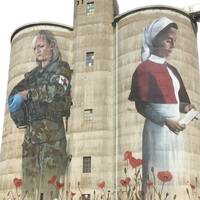 Jenny B
Jenny BThis transcription item is now locked to you for editing. To release the lock either Save your changes or Cancel.
This lock will be automatically released after 60 minutes of inactivity.